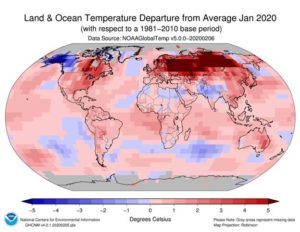by Anthony Watts, February 29, 2020 in WUWT
In a report generating substantial media attention this month, the National Oceanic and Atmospheric Administration (NOAA) claimed January 2020 was the hottest January on record. In reality, the claim relies on substantial speculation, dubious reporting methods, and a large, very suspicious, extremely warm reported heat patch covering most of Russia.
The January 2020 Climate Assessment Report, released by NOAA’s National Center for Environmental Information (NCEI), was accompanied by a map showing a giant red menace of extraordinary asserted warmth extending from the Russian border with Poland well into Siberia. Yet, the asserted hot spot appears nowhere else.

Figure 1: Map of temperature departure provided by NOAA/NCEII. Note the huge red spot over Russia.
Meanwhile, in the United States, Alaska was abnormally cold, and the contiguous United States wasn’t even close to a record.
While the media attempt to spin the NOAA announcement as more “proof” of a climate crisis, there are a few things to consider. First and foremost, January is the coldest month of the year for much of the Northern Hemisphere. You likely won’t find many people complaining that a particular January was warmer than usual. This is especially the case in Russia and Siberia.
January in Moscow is typically the coldest month of the year. Daytime high temperatures average 20°F, with average lows of 9°F. In Siberia, it is even worse. The Siberian city of Oymyakon, Russia, reached 88°F below zero (-66.67°C) in January 2018. The big red Russian “hot spot” in NOAA’s January temperature map simply shows Russia remained very, very cold, but not as excruciatingly cold as usual.
Yet, the Russian temperature data was the primary driver behind the asserted global January temperature record. This begs the question, why would Russia – and Russia alone – have such an unusual, giant red spot of unusual warmth compared to the rest of the world? Is Russia trying to influence and interfere with global climate data along with American elections?
Hardly, and the answer may be very simple and have little to do with climate change. In 2008, I identified a possible source for similarly odd reported warmth during the preceding Russian winter: Russian central-heating steam pipes.
…
